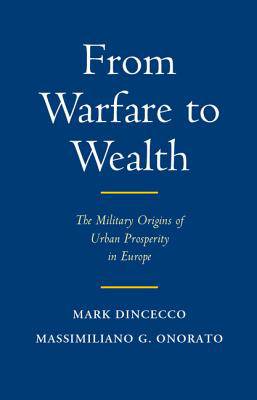
- Afhalen na 1 uur in een winkel met voorraad
- Gratis thuislevering in België vanaf € 30
- Ruim aanbod met 7 miljoen producten
- Afhalen na 1 uur in een winkel met voorraad
- Gratis thuislevering in België vanaf € 30
- Ruim aanbod met 7 miljoen producten
Zoeken
From Warfare to Wealth
The Military Origins of Urban Prosperity in Europe
Mark Dincecco, Massimiliano Gaetano Onorato
€ 152,95
+ 305 punten
Omschrijving
The economic rise of Europe over the past millennium represents a major human breakthrough. To explain this phenomenon, this book highlights a counterintuitive yet central feature of Europe's historical landscape: warfare. Historical warfare inflicted numerous costs on rural populations. Security was a traditional function of the city. To mitigate the high costs of conflict in the countryside, rural populations migrated to urban centers. Over time, the city's historical role as a safe harbor translated into local economic development through several channels, including urban political freedoms and human capital accumulation. To make this argument, the book performs a wide-ranging analysis of a novel quantitative database that spans more than one thousand years, from the fall of the Carolingian Empire to today. The book's study of urban Europe's historical path from warfare to wealth provides a new way to think about the process of long-run economic and political development.
Specificaties
Betrokkenen
- Auteur(s):
- Uitgeverij:
Inhoud
- Aantal bladzijden:
- 210
- Taal:
- Engels
- Reeks:
Eigenschappen
- Productcode (EAN):
- 9781107162358
- Verschijningsdatum:
- 14/12/2017
- Uitvoering:
- Hardcover
- Formaat:
- Genaaid
- Afmetingen:
- 163 mm x 242 mm
- Gewicht:
- 426 g

Alleen bij Standaard Boekhandel
+ 305 punten op je klantenkaart van Standaard Boekhandel
Beoordelingen
We publiceren alleen reviews die voldoen aan de voorwaarden voor reviews. Bekijk onze voorwaarden voor reviews.











